Our editor, Tola-Doll Fisher, spoke to Olympic athlete Abigail Irozuru about her drive, sense of identity, faith, culture and personal struggles with body image
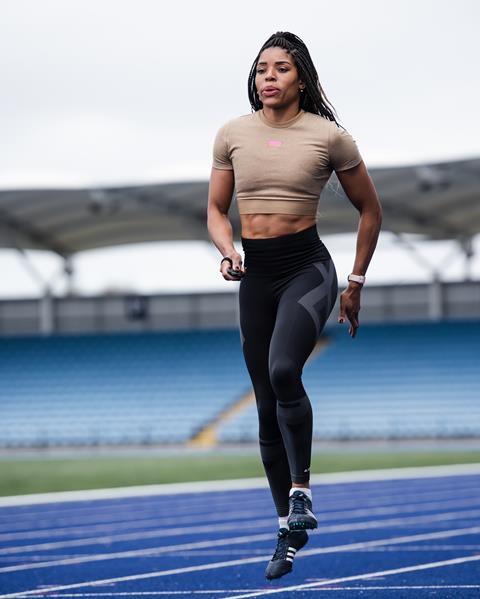
TDF: You’re most well known in your capacity as a British athlete, but how would you describe yourself?
Abigail: I have many monikers and it’s really hard because we’re taught to describe ourselves with these labels, but then if you’re wrapped up in all that, when things aren’t going so well you don’t feel as good as you should. So, I always try to start with being a daughter of the Almighty God – my dad calls me that. And an athlete for sure, and a speaker. I’m a coach and a daughter, a sister…so much.
TDF: When you say coach, do you mean coaching in terms of physical training or lifestyle coach – or something different?
Abigail: I keep it ambiguous on purpose, because I’m still doing that whole exploration of what it is that I love the most about coaching. But I am a qualified athletics coach and I also have an NLP (Neuro Linguistic Programming) diploma, so that’s also coaching around mindset and emotion, and I have a live coaching certification as well. For me, coaching is always holistic. I have coached younger athletes and track and field, but also I’ve worked with mums and corporate execs.
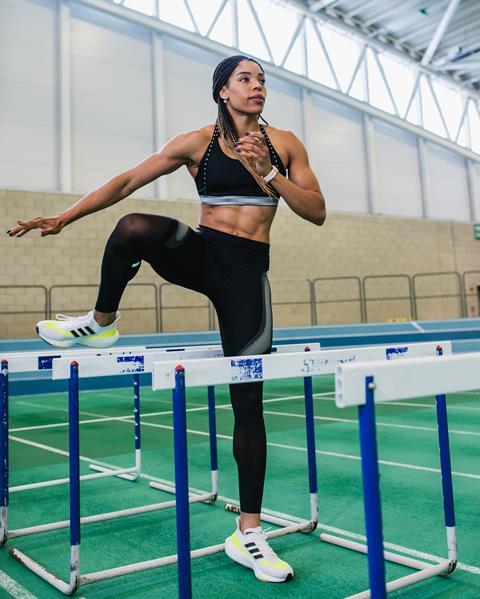
TDF: Our formative years very much influence our adult mindset, so what was your childhood like?
Abigail: I’m a born and bred Mancunian. I don’t have a Mancunian accent, though, because my parents put me through elocution lessons for a year when I was about eleven so I think it’s just ruined my accent. I pick up loads of different accents very easily, it just depends where I am. I’ve lived in France for a year and I also lived in the States for a couple of years. My accent ebbs and flows.
TDF: Why did you have elocution lessons? Is that because your parents didn’t want you to have a Mancunian accent?
Abigail: I don’t know. I really will have to ask them. I was born in England, but both my parents are Nigerian and Igbo (one of the main tribes in Nigeria). Our culture is very much driven to achieve and be excellent in all things. My dad has a really heavy Nigerian accent and I know that discrimination happened to him, especially when they first moved to the UK. Mum talks about her having to speak on the phone, because people would immediately put the phone down on him. So maybe, subconsciously, they were just aware that there’s power in accents so thought: “Let’s help her to be more articulate.”
I always try to start with being a daughter of the Almighty God
TDF: One thing I wanted to ask about is body image. Have you ever felt concerned about the way you look or how you’re presented, and have you ever compared yourself on or off social media?
Abigail: Not necessarily on social media, because I think it’s so fake and heavily curated and I also know that, generally, we’re all posting our best. But in terms of my own body image, I think my main challenge has been growing up feeling very muscular. Unfortunately, parents don’t understand or realise the sting of their words; my mum really moans about my arms. So, I’m very self-conscious and can’t wear certain outfits. Over the last couple of years, I’ve really tried to challenge myself out of that. Also, when it comes to body weight, my abs and my tummy for example, this past year I’ve been struggling with it in a way that I’ve not really struggled in the past. I keep saying if I weren’t an athlete, I wouldn’t even care. But as an athlete, it’s just so front and centre in your mind. Again, it’s having to challenge that voice and say: “This is who I am. This is what I am right now. And let’s go.” I feel I worry about it less when I have that attitude.
TDF: How did you get into sport?
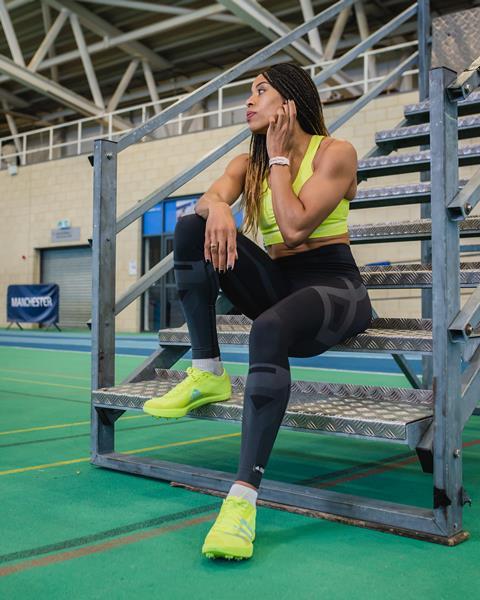
Abigail: My mum got me involved in loads of extracurricular activities. From the age of two or three, I was doing dance and gymnastics, and kicking a ball around in the park with my siblings and cousins. When I was around 13, I participated in an inter squadron track and field where I did the 100m to 200m, the relay and the long term and smashed them all!
I met the man who would become my old coach there and he asked me whether I wanted to go to Sportcity (multipurpose sports and leisure facility next to the Etihad Stadium where the Commonwealth Games took place) to train. I said: “Yeah, why not?” That’s where I started doing one day a week and then progressed until all those other activities faded away.
Hopefully the fact I’m a Christian is just reflected in who I am and how I live
TDF: You are still competing competitively. What’s the last thing you did that people might recognise you from? Was it the Commonwealth Games?
Abigail: Yeah I did the ‘Commies’ in August last year. My outdoor season is progressing slowly. We’ve had a couple of years where we had meetings with no crowds in the stadium, even the Tokyo Olympics. The difference in going into a stadium and literally not even being able to hear your own thoughts because of the deafening roar of the crowd is just amazing.
TDF: Do you think you perform better with a crowd?
Abigail: It depends. I am somebody who doesn’t necessarily need it, whereas I know there are many people who definitely vibe with the crowd. I don’t think I’m someone who loves that level of attention but I have to learn to embrace it.

TDF: Did you ever have a plan B when you were growing up?
Abigail: Plan A was to be a barrister in intellectual property. It’s still not something that is definitely dead in the water. I have my law degree; I went to UCL. I think the challenge with that was that I started becoming super passionate about athletics around the same time I started university. But there’s a timeline for athletics, and there isn’t necessarily one to be a lawyer.
TDF: You’ve talked about the focus Nigerians have on education and excellence. How did your parents take you choosing athletics over law?!
Abigail: Even when I was doing my law degree, it wasn’t necessarily obvious that I wanted to do sport. I would never have pictured myself here where I am, still doing it, at 33. And I don’t know whether even at 18 years old when I started university, I had Olympic aspirations. My mum continually used to be like: “So when are you going to retire? When are you going to end this?” My dad also probably had a similar mindset, although he’s now OK with me doing whatever I want. I think parents in general, but especially Nigerian parents, want to hang accolades on you.
TDF: What are you most proud of in terms of your achievements in the world of sport?
Abigail: Becoming an Olympian was a whole journey. I didn’t make it in 2012, despite having the standard to qualify, then in 2016 I ruptured my Achilles. I retired in 2016, but came back a couple of years later because I didn’t want to live with any regrets. The third time God honoured it, and we made it.
TDF: That’s definitely a huge achievement and I love that you didn’t close the door on that. You mentioned God, so when did you start your own personal relationship with God?
Abigail: I went to a private Christian school in Manchester. It was a really tiny school and we studied a very specific curriculum, which helped to nurture my personal relationship with God, so from the age of eight I truly committed my life.
TDF: Is it important for people who know you in the public space to know that you’re a Christian?
Abigail: That’s an interesting question, because I never thought about it like that. But I guess so. Because even if I don’t necessarily have a conversation with someone, hopefully it’s just reflected in who I am and how I live. It’s on my social media profiles too. And even when it came to me coming back to the sandpit, I was very honest in saying that I felt like I’d had a word from God about it, because it was hard to make that decision. I wanted to, but I also knew the pain, emotionally and physically, that you have to go through to get to the point that you need to, in order to be successful. I’ve been very honest in sharing that story because it was genuinely a God thing. That’s why it was a blessed decision.
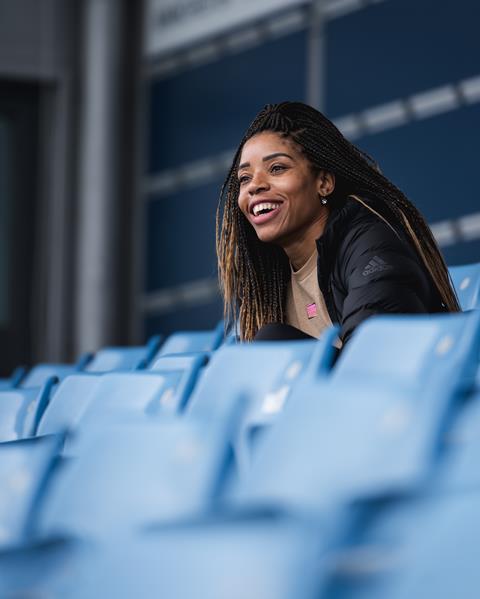
TDF: Do you feel that you are similarly led in other areas of life, in the sense that if you hear from God or if God tells you to do something, you follow that guidance?
Abigail: Yeah, something I’ve learned is that when you read the Bible, you see that obedience isn’t about doing, but doing things in a timely manner. So, if I feel something is truly from God then I will do everything in my power to act on it, even if it takes a while for my heart to engage. When you take those steps of faith hopefully they’re honoured. Honestly, sometimes it feels like it’s not worked out the way that I would hope. Then I’m like: “Oh God I heard from you – why did this happen?” But I can only do what I believe God has said I’m supposed to do and hopefully, if I’m doing it with the right heart, then I’m OK with that.
Abigail Irozuru is a Team GB Olympic Finalist (2021 Tokyo Summer Games) and a Team England Commonwealth Games Finalist (Birmingham, 2022). She has represented Great Britain and England teams consistently since 2006. Her notable achievements include a 2008 Commonwealth Youth Games’ gold medal and becoming three-time British Long Jump Champion (2015, 2019 and 2020).
In December 2022, Abigail was elected by her Olympic peers, across the Summer and Winter Games’ sports, to the Team GB British Olympic Association Athletes’ Commission. As one of 13 elected representatives, she represents the athletes’ voice nationally and internationally.
Abigail has worked in a range of corporate and educational environments, delivering tuition, lectures and keynotes since 2007 and also hosts ‘Define Your Success’ podcast. Find out more about her at abigailirozuru.com/about and connect with Abigail on social media @absisdabest












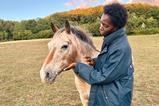



















No comments yet